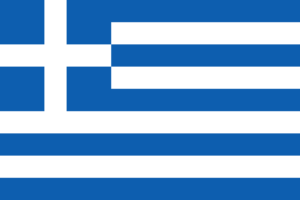| Capital | Athens |
| Population | 10,335,139 (Source: 2023 worldometer) |
| Major Cities | Athens (capital), Thessaloniki, Patras, Piraeus, Larissa, Heraklion |
| Borders | Albania, Bulgaria, Turkey, Republic of Macedonia, and it shares maritime borders with Cyprus, Egypt, Italy, and Libya |
| Gross Domestic Product (GDP) | $219,066,000,000 (2022 worldometer) |
| Currency | euro (EUR) |

Greece Major Industries: tourism, food and tobacco processing, textiles, chemicals, metal products; mining, petroleum
Greece Agricultural Products: wheat, corn, barley, sugar beets, olives, tomatoes, wine, tobacco, potatoes; beef, dairy products
Greece Natural Resources: lignite, petroleum, iron ore, bauxite, lead, zinc, nickel, magnesite, marble, salt, hydropower potential
Greece Major Exports: food and beverages, manufactured goods, petroleum products, chemicals, textiles
Greece Major Imports: machinery transport equipment, fuels, chemicals
Total Size of Greece: 131,957 km2 (source: 2022 The world factbook)
Geographical Low Point of Greece: Mediterranean Sea 0 m
Geographical High Point of Greece: Mount Olympus 2,917 m
Climate of Greece: Temperate; mild, wet winters; hot, dry summers
General Terrain of Greece: mostly mountains with ranges extending into the sea as peninsulas or chains of islands
World Region or Continent of Greece: Europe
Geographical Coordinates: 39 00 N, 22 00 E
Major Landforms of Greece: Over 200 inhabited islands including Crete, Euboea, Rhodes, and Lesbos. Aegean Islands, Argo-Saronic Islands, Peloponnese peninsula, Mount Olympus, Pindus Mountain Range, Vikos Gorge, Rhodope Range
Major Bodies of Water: Aliakmonas River, Achelous River, Evros River, Lake Volvi, Lake Trihonida, the Prespa Lakes, Ionian Sea, Aegean Sea, Sea of Crete, Mediterranean Sea
Famous Places of Greece:
Acropolis and Parthenon in Athens,
Ionian Islands,
Mount Athos Orthodox monastery,
ancient city of Mystras,
Delphi Theatre,
Meteora (monasteries that are “suspended in air”),
the whitewashed houses of the city of Lindos,
Samaria Gorge,
Myrtos Beach,
Santorini
Greece Government Type: parliamentary republic
Greece Nationality: Greek(s)
Greece National Holiday: Independence Day, 25 March (1821)
Other Holidays of Greece: New Years’ Day (January 1), Epiphany (January 6), Independence Day (March 25), Good Friday, Easter, Labor Day (May 1), Whit Monday, Assumption (August 15), Ochi Day (October 28), Christmas (December 25)
Greece Independence: 1829 (from the Ottoman Empire)
Greece National Symbol:
- Animal – Dolphin
- Tree – Olive Tree
- Flower – Laurel branch, violet
- Motto – Freedom or death
- Colors – Blue and white
- Greek Coat of Arms – A white cross on a blue shield surrounded by a circle of blue and white laurel branches.
- Food – Feta, Greek salad, olive oil
- Other symbols – Phoenix (mythical), double-headed eagle, Vergina Sun, the goddess Athena, the owl
Greece National Anthem or Song: Ymnos eis tin Eleftherian (Hymn to Liberty)
Greece Languages Spoken: Greek 99% (official), English, French
Greece Religions: Greek Orthodox 98%, Muslim 1.3%, other 0.7%
| Names | Professions |
| Alexander the Great | World leader |
| Sophocles | Playwright |
| Socrates | Philosopher |
| Pete Sampras | Tennis player |
| Georgios Samaras | Soccer player |
| Pythagoras | Mathematician and scientist |
| Plato | Philosopher |
| Aristotle Onassis | Businessman |
| Andreas Papandreou | Politician |
| Pericles | Leader of Athens |
| Homer | Epic poet who wrote the Iliad and the Odyssey |
| El Greco | Artist |
| Maria Callas | Opera singer |
| Aristotle | Philosopher and scientist |
The first Olympic Games were held in Greece. This match took place in 776 BC, more than 2600 years before him. at Olympia instead. The Olympic tradition continued until 393 AD and was not revived until 1896, when the first Olympic Games were held in Athens, Greece.
Women’s participation in the Olympics? no way! Women were forbidden to watch or participate in the ancient Olympic Games.
The classics of all ages and cultures originated in ancient Greece. Two of his most important Greek poems, Homer’s Odyssey and Iliad, were written during the time of ancient Greece.
Greece’s real name is not Greece! The official name of Greece is the Republic of Greece, also known as Hellas.
Ancient Greece had her over 1,000 city-states (polis in Greek). The most important were Athina (Athens), Sparta (Sparta), Corinth (Corinth), Tiva (Thebes), Syracuse (Syracuse), Aegina (Aegina), Rhodes (Rhodes), Argos, Eretria, and Eris.
The ancient Greeks had an unusual method of washing. They cleaned their clothes with the fat of the sacrificed animals!
Did Ancient Greece Eat Beans? I never have! . Many ancient Greeks believed that eating beans was bad because they contained the souls of dead people. scared!
Olympus is the highest mountain in Greece. It is also one of the highest peaks in Europe. This mountain is located on the border of Thessaly and Macedonia, with an altitude of he 2,917 meters.
Greece is one of the most mountainous countries in Europe. 80% of the country is mountainous. In addition to Olympus, the country has other famous mountains such as Parnassus, Taygetus and Pelion.
Greece has the longest coastline in Southern Europe. More than 60km of coastline surrounds Athens!
Greece is pretty small. Greece is smaller than the US state of Alabama.
Summer in Greece is (very) hot! The highest temperature ever recorded in Europe was 48 °C in Athens on July 10, 1977.

